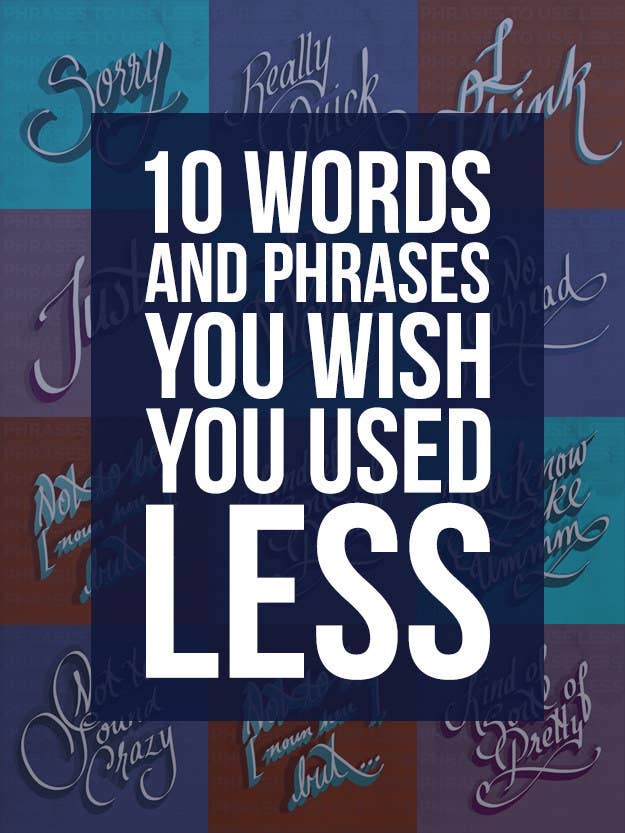
We asked BuzzFeed employees what words they consider negative self-talk. But are the things that annoy us really that egregious?
Before you flagellate yourself for using "like" or "um" too much, a lot of linguistic devices don't necessarily undermine what you're saying. "Instead, they are a natural way to negotiate social encounters so that you don't threaten or offend the person you're speaking with," Laurel Smith Stvan, Ph.D., a linguistics professor at the University of Texas at Arlington, writes in an email.
Here are some words and phrases that we could use less of — or maybe not worry about as much:
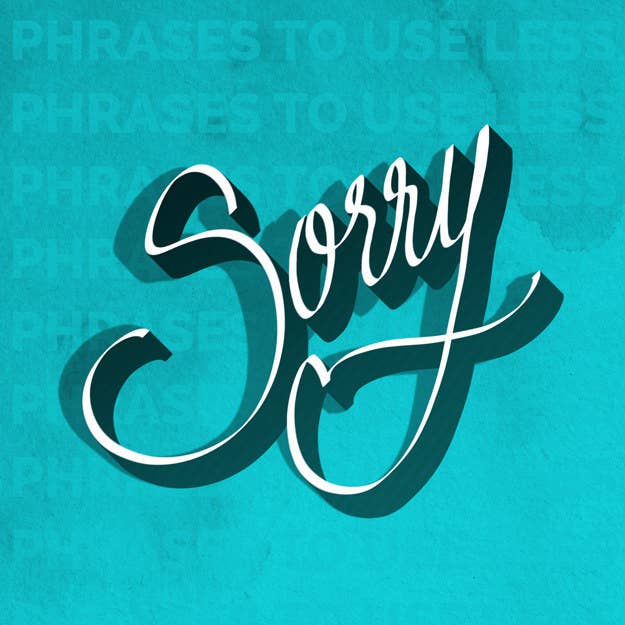
1. "Sorry"
Overly apologizing can be a self-defeating habit that you don't notice until someone points it out. Not all apologies are bad: Easing into conversation with "Sorry to interrupt" or "Excuse me, do you have a minute?" can be signals of respect to the person you are addressing, says Stvan. And if you mess up, of course you should 'fess up.
But if you're atoning for things that aren't offenses, jot every time you do it in your phone's notepad. As the list grows, you'll see how much you can snip out. (If this feels embarrassing, read 31 things I apologized for and you won't feel so alone.)
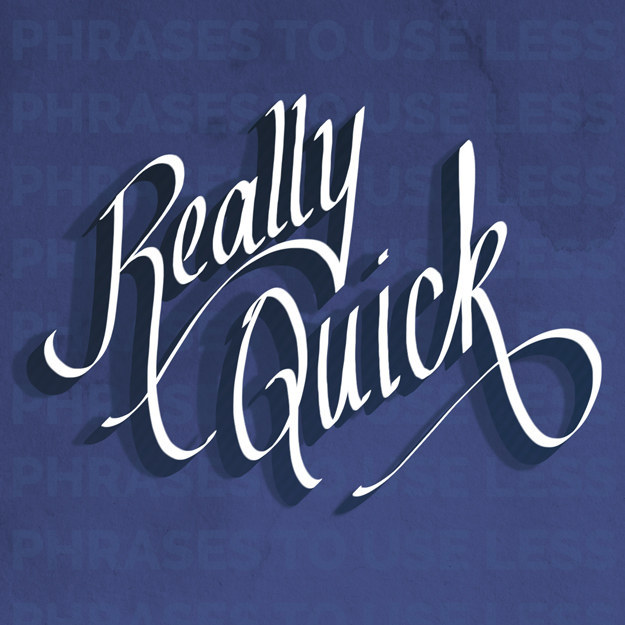
2. "Really quick"
Tacking this on before a question can diminish its importance because it can infer the other person is too busy to answer you, a mere serf. Naturally if you have good rapport with someone and you need a brief moment, this can be a gesture of civility.
But if you regularly demote yourself, remember: Your time is valuable! So rise above your self-designated plebeian status and backspace those words from whence they came.
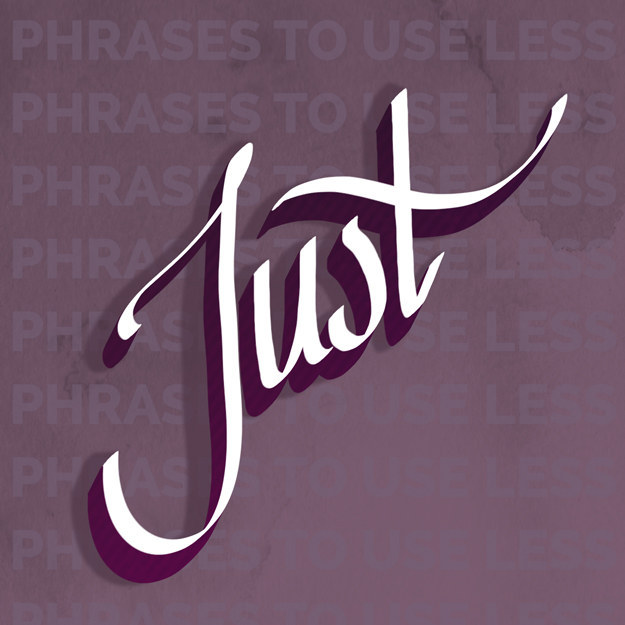
3. "Just"
This sometimes acts as a variation of "really quick," especially in tandem with other wishy-washy musing. Look at these examples:
Example 1: I was just wondering if you could tell me if I have something in my teeth.
Example 2: Do I have something in my teeth?
It's a tiny word with a not-so-tiny effect. Slice it out of emails, where you can actively catch it first, and you'll see your other words congregate as succinct little warriors without the meandering sidekick.

4. "I think"
Hitching this and "I feel like" on sentences came up the most as something our lady staffers wish they did less. Jezebel's Katie J.M. Baker even wrote about the tic and found women use it more often than men. A linguistics professor told her it could be to "soften" assertions, or because there's an uptick in its usage and women catch on to verbal trends faster than dudes.
So we turned to Julie Amberg, associate professor of English at York College. When writing, you're already saying what you think, she wrote in an email. That's why she refers to additions like "personally" and "in my opinion" as deadwood: On paper, they're words that clutter up our prose and make it awkward and unclear. It takes some practice to get rid of flotsam, so the readjusting takes some time.
When we talk, though, those words can buy us a few moments to collect our thoughts, Amberg says. And as Baker writes, "I feel like" implies that your opinion might not be set in stone yet — and it's often encouraged as a communication tool in therapies. So "I think" isn't as self-defeating as it seems.

5. "No worries!"
For those with high empathy, it's instinctual to want to cushion someone's feelings. But if someone messes up and you are freaking worried, cut this phrase out of your response. You have your own plate heaped with to-dos, and it's OK to acknowledge mistakes (note: constructively) without soaking up others' responsibility.

6. "No, go ahead."
Did someone interrupt you? Steamrollers are everywhere, so try to continue your thought like you started, because it's probably a very good one.
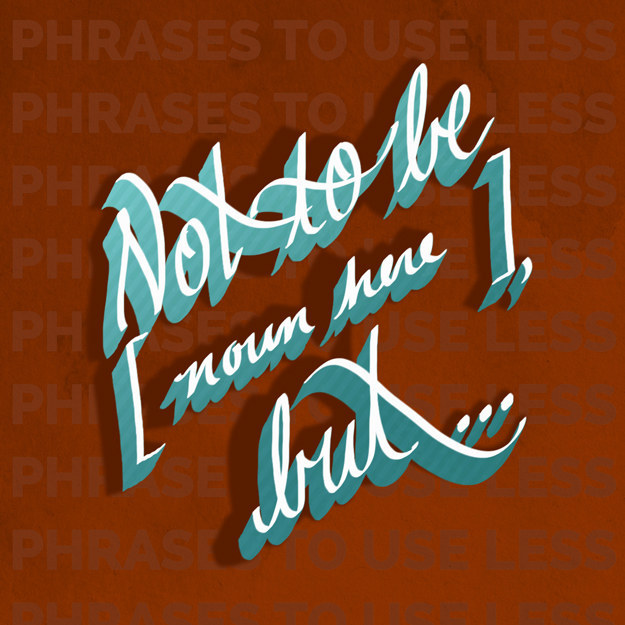
7. "Not to be [noun here], but..."
If you say, "Not to be a jerk, but..." you might as well drop the "not" because you are being that thing. ("No offense, but..." also usually falls under this category.) Disclaimers aren't a pass to say anything you want, so you might want to revamp the approach with some, you know, tact.

8. "Kind of," "sort of," "pretty," etc.
Actually, these aren't always so bad. Linguists refer to these qualifying terms as hedges, and they've probably been around for as long as we have, says Stvan. "There is a social value in using hedges to soften claims in face-to-face conversations, or to not claim more than you are sure of," she says.
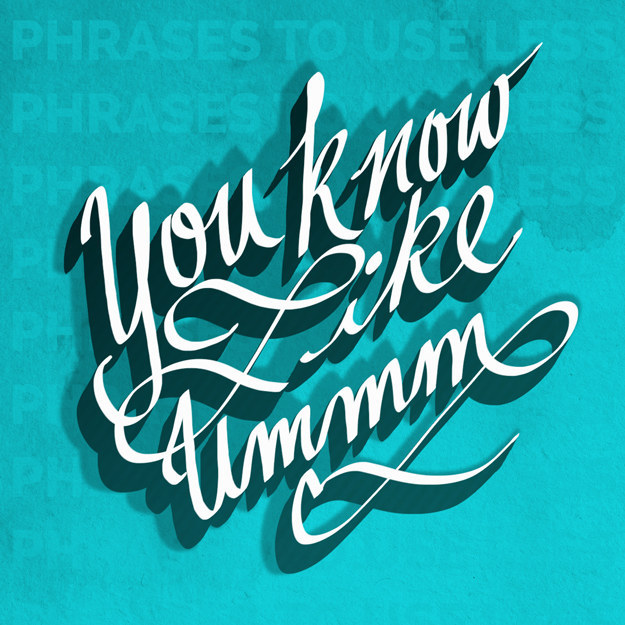
9. "You know," "like," "um," and other fillers
Filler words can be distractions, so it's helpful not to overuse them, says Stvan. "But fillers are also a crucial part of fluent speech. Without any, a person sounds unnatural — like a robot!"
In fact, learning the right set of fillers in another language is part of becoming fluent in it, she says. Sprinkling an "uh" or "you know" in your speech is normal, but when they link arms in a long sequence, it's too much. Some examples from Stvan:
Odd-sounding fillers: "And I, euh, want, rrr, to find out what time the class starts."
Natural-sounding fillers for English: "And I, uh, want, you know, to find out what time the class starts."
Too many fillers: "And I would, um, just, like, you know, want, like, um, you know, to find out what time the class starts."
When speaking, it's all about balance: If overused, they can become a diversion, but in moderation, they're natural.

10. "Not to sound crazy," "This is stupid, but..." etc.
While in some cases you are dampening the strength of what you're about to say, self-deprecation varies from community to community, so there's no magical uniform recommendation. "It's important to find the right balance for the age, gender, and local dialect of the speakers you are talking with," says Stvan.
Using them a little shows you're not full of yourself, she says, but using verbal humility too much shows you don't value your own strengths and can sometimes come off as unbelievable.
Monitor when you say them, and then dig into why you said it. The root of your word selection can help point you in the right direction: If they're not jokes, maybe omitting them can help bolster your self-confidence.

